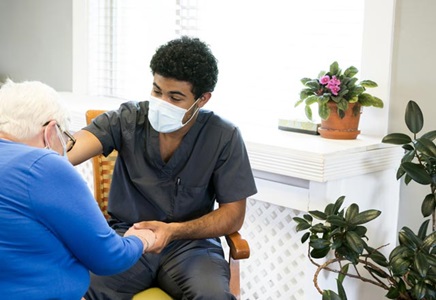The Surprising Health Bonus of Caregiving
With demands on time, energy, emotions and relationships, caregiving isn't easy. So you might think it would take its toll on the physical health of those who care for family members with chronic conditions.

But new research offers a positive surprise: Family caregivers may live longer.
This longevity advantage emerged when a team of scientists led by Johns Hopkins experts looked at six years of health data for 3,503 caregivers and an equal number of non-caregivers.
Those who regularly tended to the needs of a family member enjoyed a nine-month extension in life expectancy—even if they felt some stress and strain. The researchers also saw no differences in chronic health issues between the two groups.
“Taking care of a chronically ill person in your family is often associated with stress, and caregiving has been previously linked to increased mortality rates,” says David L. Roth, Ph.D., director of the Johns Hopkins Center on Aging and Health. But this study’s results painted a much more hopeful picture. “In many cases, caregivers reported receiving benefits like enhanced self-esteem, recognition and gratitude from their care recipients,” Roth adds.
If you are a caregiver—or know one—these smart strategies could help harness this advantage.
Research Shows Breaks Benefit Caregivers and Loved Ones
“Making sure to take some time off is crucial for caregivers — it helps maintain their health and provides an emotional break so that they can continue taking wonderful care of their loved ones,” Samus says.
- Better blood pressure. Getting away to do something pleasant was shown to reduce blood pressure in one caregiver study. That’s especially notable because caregivers may be at risk for high blood pressure.
- Less depression. Making time for exercise, time with friends, breathing exercises or whatever works for you could lower your risk.
- Reduced stress. Taking advantage of local adult daycare programs for your loved one can give you a stress-soothing break and help a family member with dementia sleep better at night too.
Stay social.
In an earlier Johns Hopkins study, researchers found that caregivers who stayed connected with friends and other family members had better emotional health than those who felt isolated, says researcher Quincy Samus, Ph.D., director of Translational Aging Services Core.
Don’t be shy requesting specific help so you can get some time away, Samus suggests: “Could Mom stay with you for a week in April?” or “Could you spend two hours with Dad next Wednesday so I can attend garden club?”
Treatment Support your Loved Ones with Personal Care Services

Make your own health a priority.
Eat well, carve out time for exercise (even in short bursts) and get the medical care you need, including checkups, tests and flu shots. About one in six caregivers say their responsibilities take a toll on their physical well-being. In one survey, three-quarters of caregivers who were in fair to poor health didn’t see their doctors as recommended. More than half admitted to less-than-healthy eating and exercise habits.
Draw strength from your faith.
“Caregivers who found meaning in their work through their religion or spiritual beliefs also had better emotional health in the study, even if they didn’t go to religious services,” Samus says.
Definitions
Caregiving: The assistance family, friends and professionals provide to those who are old, sick or otherwise unable to care for themselves. Caregiving can include buying groceries, cooking meals, cleaning, assistance with bathing or personal care, making and driving someone to medical appointments, dispensing medicine, helping someone get in or out of bed, and more.






